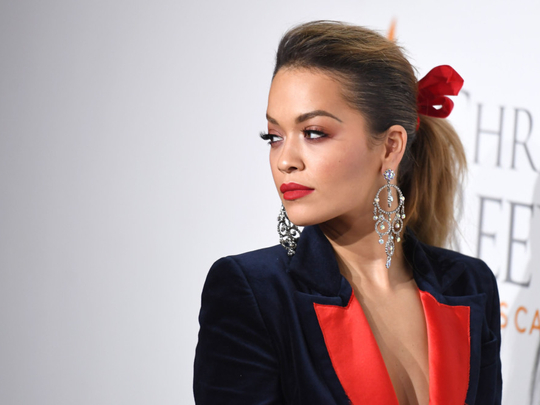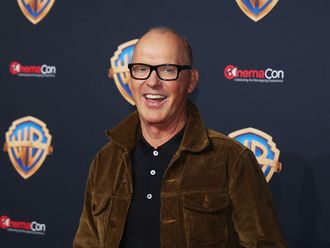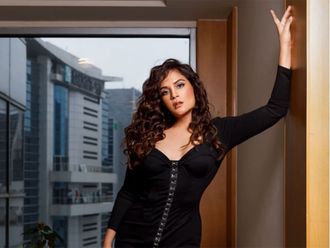
We are a mere two minutes into a conversation in a portable cabin near a sound stage in Acton, west London, five minutes’ walk from the real-life Apprentice Cafe Of Doom. Rita Ora is shooting a promo clip, involving a cast of dozens and a stint in a red Ferrari, for her forthcoming presenting gig at the MTV Europe Music Awards (EMAs), and somehow we have gone from discussing the ad’s storyboard, to the topic of whether or not autumn is the best season, to Ora’s birthday being in November, which leads her to speculate over whether or not she will join the 27 club. And now, in a chat that has escalated as quickly as the early stages of Ora’s career, we are discussing meltdowns. “My 25 was [expletive],” she adds. “My 26 is OK.”
Rather ludicrously it has been more than half a decade since the release of Ora’s debut album, Ora. Ironically, her inability to release a second album in the time it took the Beatles to release nine was both the cause and the effect of a falling-out with Jay-Z and Roc Nation, who had signed her at the age of 18: at the end of 2015, Ora filed a lawsuit claiming she had become a low priority among that company’s rapidly diversifying interests, and demanded to be released from her contract. Roc Nation responded in the form of a $2.3 million (Dh8.4 million) counter-lawsuit claiming Ora hadn’t delivered enough albums. The ensuing legal debacle meant she couldn’t release any.
“I’ve always thought you pick the artist you want to be; I’ve chosen to become a 360-degree artist”
When Ora and I meet again two weeks later, we are 135-metres up in a pod on the London Eye, where she is taking part in a live MTV webcast. The height does not faze pop’s premier skydive enthusiast, but once the webcast is done we jump in a car and head to a nearby hotel for our interview, where I ask more about taking on Jay-Z. Ora can put a positive spin on it all now — “The best thing that ever happened to me”; “like going through a musical detox” and so on — but things were less easy at the time. “It felt,” she accepts, “like the worst thing. But it was the only decision I could make. My appreciation and respect for them hasn’t changed at all.”
So what did change? “Me. I wanted a change of spirit, I wanted a fresh start.” It seems strange, I suggest, that Roc Nation couldn’t understand the shifting demands of the creative spirit. “They did!” Rita exclaims. “And what’s why it was an easy separation. It could have been bad, but it was very respectful. It was one of the easiest separations ever.”
You took them to court! “It didn’t go to court. I can’t go into crazy political details obviously, for ... reasons. But it was easy. Amazing.”
Reasons! Easy! Amazing indeed. Now in a new deal with Atlantic, Ora is back on track, her new album including a song titled Soul Survivor, which will doubtless chime with the many artists who Ora says privately messaged her to tell stories of their own label woes. She rattles off some of the song’s lyrics, ending with: “I started from nothing, I’ve got nothing to lose”. But did she really feel like she had nothing to lose? “Yes,” she shrugs. “I lost a lot of confidence in myself. I thought: ‘What am I going to do?’”
Well, what she actually did involved making a fortune outside of pop, a reported £3 million (Dh14 million) in 2016 — a figure she doesn’t dispute today — without releasing a note of new music, thanks to live performances, acting (including 2015’s Southpaw plus two Fifty Shades movies, with a third due next year) and TV roles (on both The Voice and The X Factor, plus America’s Next Top Model and a recent US boyband show), along with endorsement deals for the likes of adidas. “Yeah,” is Ora’s response. “But is it fulfilling for me? That’s the question.”
Good point: is it fulfilling for you? “You know how people do jobs?” Yes. “People, everyday people, do jobs from nine to five that I don’t think they wished for when they were kids. I love everything I’ve done as a woman and as a businesswoman, but my whole life and passion and fulfilment in my heart has always been about my music.”
Glossing over the fact that everyday nine-to-fives don’t generally involve £1.5 million adidas campaigns, I draw a circle on a piece of paper and ask Ora how we would divide this potential pie chart to represent her career. It doesn’t go well. “Music is in all of it!” she declares. “It’s like a cocktail! It’s a Long Island iced tea!” In the end, we settle on something that starts off looking like a ring doughnut, which feels a little unfair as she is off bread (and booze) until the EMAs are over, but still: the outer ring, music, surrounds everything else, with one or more inner rings representing Rita’s other endeavours. ”We’re in 2017!” Ora insists. “You can do more than one thing. I’ve always thought you pick the artist you want to be; I’ve chosen to become a 360-degree artist. In this generation we’re in, and there’s a new breed of us — 360-degree artists are able to do multiple things.”
Rita seems pleased when I express my amazement that these multiple things can include performing for the Pope at the canonisation of Mother Teresa (“His ride is amazing”) while also taking a role in dubious sagas such as Fifty Shades Of Grey, but she adds that there is an inevitable cost to a busy calendar.
“Sometimes you work yourself so hard that you don’t realise, and then it’s just ...” She makes the sound of a small explosion. And then she brings up an occasion in 2013 when she collapsed at a photo shoot in Miami. “There were helicopters and stuff. It was really bad. It was pure exhaustion, which I didn’t know was a real thing. But I just blacked out. I woke up in hospital and everyone was like: ‘Right, you need to chill.’ You sacrifice a lot of yourself, and your mental health, and your physical self, to be everywhere at the same time. I guess it’s the life you choose, isn’t it? But I’m living the dream.”
Anyone feeling snippy about Ora’s dream, or her ambition, or her work ethic — lucrative as their combined power clearly is — may do well to remember her upbringing: when she was one, and her sister not much older, Ora’s parents fled Kosovo and arrived in the UK as refugees, living four to a room before moving to less cramped council accommodation in the Foreland House block in west London. She grew up two streets away from Grenfell Tower, which shines a personal light on her decision to turn up and help with relief efforts the day after the fire in June. Ora describes her father working double shifts while her mother studied to become a psychiatrist and waitressed at night. Eventually, her parents could afford to send her to the private Sylvia Young Theatre School. “They figured out a way,” is how she puts it. “I was the only student at school who wasn’t from a rich family: all these kids were Louis Vuittoned out, and I was there with the same backpack for six years. But I didn’t care.”
At 16, Ora talked herself into a coffee with manager Sarah Stennett, who had already had success with the Sugababes and in 2017 is one of the planet’s most powerful managers. “I was desperate to get some studio time,” Ora remembers. “She looked at me and said: ‘I’m going to help you. We’re going to put you in the studio today’.”
Before negotiating the Roc Nation deal a year or two later, another of Stennett’s early suggestions was to talk Ora out of a BBC talent show aimed at finding the following year’s Eurovision entry, and one does wonder where Ora might be now had she not bailed on Your Country Needs You. “Oh God,” she groans. “Let’s not think about that.” Then a switch flicks. “But I am a fan of Eurovision!” she quickly adds. “I do watch it. My parents used to watch it all the time!” Great news: so she would be up for representing the UK next year, then? “I think ...” is the way she begins an answer requiring such diplomacy that what follows is a pause lengthy enough to accommodate an entire Rita Ora album cycle. “ ... I might be on tour.”
She actually might, you know. Ora’s second album is finally nearing completion and she says it is different from her debut which, she says, was a question of “who can contribute; hey, everyone, let’s jump in the basket. It definitely wasn’t how I thought albums were meant to be made. And now I see I was right: they’re not meant to be made like that.”
By contrast, Ora’s second album — which is absolutely, definitely coming out, if not until March — is the result of sessions with relatively few collaborators. It will not include new music with Calvin Harris, who reportedly pulled his songs from the project when the couple’s romance ended. On that topic, Ora says, well, for reasons she explains, not very much at all: “It’s one of these things that ... Well, for me it’s in the past. Whatever I say somehow turns into a headline and it becomes a story again. I really don’t want there to be any more headlines about it. He’s a great guy and we’re on good terms now.”
The album will include the recent Ed Sheeran-penned single Your Song, Rita’s most successful track for some time, as well as pensive-but-banging new single Anywhere. There is also future single Girls, to be released with Charli XCX. Girls is about “having that empowerment of sticking together, et cetera”. “The song,” Rita clarifies, “represents freedom of speech of being able to love whoever you love, no matter what colour, race, sex, size, and being able to celebrate each other as females.”
Ora’s sense of sisterhood seems to extend to social media: she finds it useful as a space to communicate with fans (“like punk fans used to do back in the day without the internet”) but accepts the harmful effects of trolling. “It’s so discouraging for girls, especially, to have that sort of bullying,” she adds. “It’s awful, it’s disgusting and I absolutely despise it. I’m used to it now, but it’s so unfair.”
Depressing as it may be that anyone has to accept being “used to it” as part of their job, Ora’s sentiment sits oddly against her decision last year to collaborate on a shoot for French magazine Lui with the photographer Terry Richardson, who has been at the centre of multiple allegations regarding the sexual exploitation of women. (Since our interview took place, Richardson has faced renewed scrutiny amid reports he has been blacklisted from all Conde Nast publications, including Vogue .) I ask Ora if she had any qualms. “I loved his collection of photography, I loved his book with Lady Gaga, the shoot was my choice and it was totally my suggestion,” she begins. “I can only talk about my experience of working with him: it was a relaxed day and I had the time of my life. At the time, I wasn’t aware of the accusations.” Would knowledge of his reputation have changed her mind? “If I was aware of any of the accusations against Terry I would of course have rethought my decision.”
“I’m starved!” Ora suddenly announces, turning around to see the next table, atop which sits a plastic container. “Look, there’s my meal,” she grimaces. “Dry chicken and vegetables. It’s horrible.” But Ora’s lunch is not alone: around that plastic box sit several people, all waiting for Ora to start her next meeting. Her downtime this afternoon will consist of the time it takes to walk from our table to theirs: three seconds.
Don’t miss it
The single Anywhere by Rita Ora is out now. She presents the MTV EMAs on Sunday, November 12.













